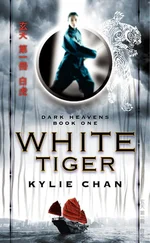"Name."
"Balram Halwai."
"Age."
"No age."
"No date of birth?"
"No, sir, my parents didn't make note of it."
He looked at me and said, "I think you're eighteen. I think you turned eighteen today. You just forgot, didn't you?"
I bowed to him. "That's correct, sir. I forgot. It was my birthday today."
"Good boy."
And then he wrote that down in his book and told me to go away. So I got a birthday from the government.
I had to be eighteen. All of us in the tea shop had to be eighteen, the legal age to vote. There was an election coming up, and the tea shop owner had already sold us. He had sold our fingerprints-the inky fingerprints which the illiterate person makes on the ballot paper to indicate his vote. I had overheard this from a customer. This was supposed to be a close election; he had got a good price for each one of us from the Great Socialist's party.
Now, the Great Socialist had been the boss of the Darkness for a decade at the time of this election. His party's symbol, a pair of hands breaking through handcuffs-symbolizing the poor shaking off the rich-was imprinted in black stencils on the walls of every government office in the Darkness. Some of the customers at the tea shop said the Great Socialist started off as a good man. He had come to clean things up, but the mud of Mother Ganga had sucked him in. Others said he was dirty from the start, but he had just fooled everyone and only now did we see him for what he was. Whatever the case was, no one seemed able to vote him out of power. He had ruled the Darkness, winning election after election, but now his rule was weakening.
You see, a total of ninety-three criminal cases-for murder, rape, grand larceny, gun-running, pimping, and many other such minor offenses-are pending against the Great Socialist and his ministers at the present moment. Not easy to get convictions when the judges are judging in Darkness, yet three convictions have been delivered, and three of the ministers are currently in jail but continue to be ministers. The Great Socialist himself is said to have embezzled one billion rupees from the Darkness, and transferred that money into a bank account in a small, beautiful country in Europe full of white people and black money.
Now that the date for the elections had been set, and declared on radio, election fever had started spreading again. These are the three main diseases of this country, sir: typhoid, cholera, and election fever. This last one is the worst; it makes people talk and talk about things that they have no say in. The Great Socialist's enemies seemed to be stronger this election than at the last one. They had made pamphlets, and went about on buses and trucks with microphones, and announced they were going to topple him over and drag the River Ganga and everyone who lived on its banks out of the Darkness and into the Light.
At the tea shop, the gossip grew furious. People sipped their tea and discussed the same things again and again.
Would they do it this time? Would they beat the Great Socialist and win the elections? Had they raised enough money of their own, and bribed enough policemen, and bought enough fingerprints of their own, to win? Like eunuchs discussing the Kama Sutra, the voters discuss the elections in Laxmangarh.
One morning I saw a policeman writing a slogan on the wall outside the temple with a red paintbrush:
DO YOU WANT GOOD ROADS, CLEAN WATER, GOOD
HOSPITALS? THEN VOTE OUT THE GREAT SOCIALIST!
For years there was a deal between the landlords and the Great Socialist-everyone in the village knew about this-but this year something had gone wrong with the deal, so the four Animals had joined together and started a party of their own.
And below the slogan the policeman wrote:
ALL INDIA SOCIAL PROGRESSIVE FRONT
(LENINIST FACTION)
Which was the name of the landlords' party.
In the weeks before the elections, trucks bumped up and down the dirty street of Laxmangarh, full of young men holding microphones: "Stand up to the rich!"
Vijay, the bus conductor, was always on one of these trucks. He had quit his old job and joined politics now. That was the thing about Vijay; each time you saw him he had done better for himself. He was a born politician. He wore a red headband to show that he was one of the Great Socialist's supporters, and made speeches every morning in front of the tea shop. The landlords brought in trucks full of their own supporters in retaliation. And from these trucks men shouted out, "Roads! Water! Hospitals! Vote out the Great Socialist!"
A week before the elections, both sides stopped sending out their trucks. I heard what had happened while cleaning up a table.
The Animals' bluff had worked. The Great Socialist had agreed to cut a deal with them.
Vijay bowed down and touched the feet of the Stork at a big rally in front of the tea shop. It seemed that all differences had been patched, and the Stork had been named the president of the Laxmangarh branch of the Great Socialist's party. Vijay was to be his deputy.
Now the rallies were done. The priest celebrated a special pooja to pray for the Great Socialist's victory; mutton biryani was distributed on paper plates in front of the temple; and in the evening, there was free hooch for all.
Lots of dust and policemen came into the village next morning. One officer read out voting instructions in the marketplace.
Whatever was being done, was being done for our own good. The Great Socialist's enemies would try and steal the election from us, the poor, and take the power away from us, the poor, and put those shackles back on our hands that he, the Great Socialist, had so lovingly taken off our hands. Did we understand? And then, in a cloud of dust, the police drove off.
"It's the way it always is," my father told me that night. "I've seen twelve elections-five general, five state, two local-and someone else has voted for me twelve times. I've heard that people in the other India get to vote for themselves-isn't that something?"
On the day of the election, one man went mad.
This happens every time, at every election in the Darkness.
One of my father's colleagues, a small dark-skinned man whom no one had taken any notice of until now, was surrounded by a mob of rickshaw-pullers, including my father. They were trying to dissuade him, but only halfheartedly.
They had seen this thing happening before. They wouldn't be able to stop this man now.
Every now and then, even in a place like Laxmangarh, a ray of sunlight will break through. All these posters and speeches and slogans on the wall, maybe they get into a man's head. He declares himself a citizen of the democracy of India and he wants to cast his vote. That was where this rickshaw-puller had got to. He declared himself free of the Darkness: he had made his Benaras that day.
He began walking straight to the voting booth at the school. "I'm supposed to stand up to the rich, aren't I?" he shouted. "Isn't that what they keep telling us?"
When he got there, the Great Socialist's supporters had already put up the tally of votes outside on a blackboard: they had counted 2,341 votes in that booth. Everyone had voted for the Great Socialist. Vijay the bus conductor was up on a ladder, hammering into the wall a banner with the Great Socialist's symbol (the hands breaking their shackles). The slogan on the banner said:
CONGRATULATIONS TO THE GREAT SOCIALIST ON HIS
UNANIMOUS VICTORY FROM LAXMANGARH!
Vijay dropped the hammer, the nails, and the banner when he saw the rickshaw-puller.
"What are you doing here?"
"Voting," he shouted back. "Isn't it the election today?"
I cannot confirm what happened next, even though I was only a few feet behind him. A big crowd had gathered to watch him from a distance, but when the policeman charged at us, we turned and ran in a stampede. So I never saw what they did to that brave, mad man.
Читать дальше












